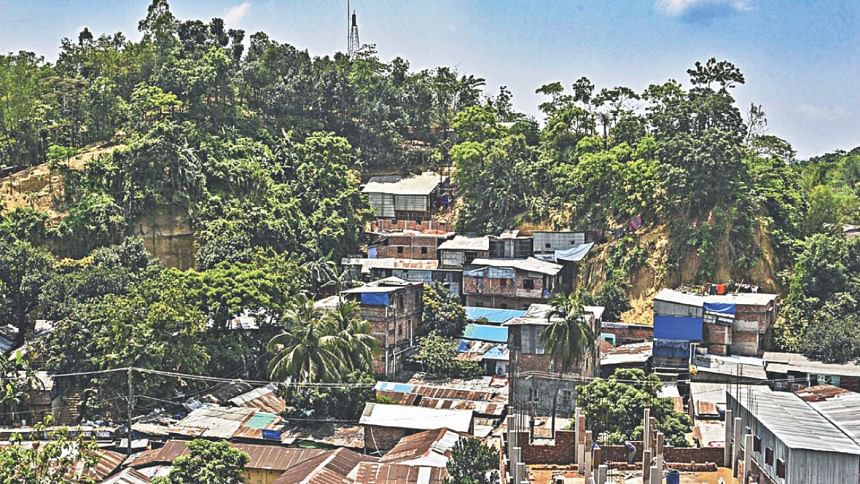Thousands at risk of landslide

Thousands of people living on the slopes of hills in Chittagong, Chittagong Hill Tracts and Cox's Bazar are exposed to landslides in the rainy season due to cutting of hills and unauthorised use of public land.
Many cut hills and trees to build their houses while others rent shanties built on hilly land grabbed by influential people. The trend could not be stopped despite repeated landslides that claimed scores of lives in the districts over the years.
Yesterday's landslides in Chittagong, Rangamati and Bandarban after Monday night's downpour were history repeating itself.
Environmentalists had feared of such landslides, like that of 2007 when 117 were killed in Chittagong city.
In Chittagong city, over 50,000 people of low-income group live on the slopes of 30 hills.
Abdul Jalil, additional deputy commissioner (Revenue) of Chittagong, said they conduct eviction drives, and that the city authorities too should do the same to recover illegally occupied land.
The Hill Management Committee, after the landslides of 2007, proposed permanent rehabilitation of the hill dwellers, afforestation and building retaining walls on hills vulnerable to landslides.
Locals, however, said for many years all that the Chittagong district administration did was ask people to leave the hills via megaphones and evict them during the monsoon.
Amena Begum, a resident of Batali Hill area, said before cyclone Mora she left her house along with her five-year-old son after the city corporation authorities disconnected her utility services.
She returned the next day.
“My husband is an addict. He does not take care of us. I have no choice but to return to my home as it is not possible for me to rent a house somewhere else,” said Amena, a house help.
Md Al Amin, a resident of Motijhorna area, said he has nowhere else to go.
"Our income is not enough to rent a house outside this area … If they (authorities concerned) give us a permanent place we will go there,” he said.
Prof Jahangir Alam, former vice-chancellor of Chittagong University of Engineering and Technology, said when tree and hill cutting continue unabated, the consequence is landslides in the rainy reason because most of the hills in Chittagong and hill tracts areas have soft soil.
Jahangir said many influential and politically-blessed people were behind hill cutting, building houses on hills and renting those out to the poor. There were at least 15 hills in and around Chittagong city where illegal hill cutting was going on, he added.
According to an official of the district administration, around 60,000 people in Bandarban live on the foot and slopes of hills.
Jumlian Amlai, president of Chittagong Hill Tracts Forest and Land Rights Protection Movement Bandarban Chapter, said cutting hills and building homes there was causing the disasters.
He said the hill people do not cut hills to build houses. If someone really needs to build a home on a hill slope, they build traditional "Machang" type homes using pillars, not by cutting hills.
Settlers usually cut hills to build homes. In recent times, some Rohingyas too have been cutting hills.
Jumlian said people mostly in Lama, Naikkhangchhari, Ali Kadam and Bandarban sadar have houses on hill slopes.
Shahidul Haque, who rents a house on a hill slope in Kashempara of Bandarban, said, "I know it is risky in the rainy season but what can I do? I am a poor rickshaw-puller."
He said he moved to Bandarban from Patuakhali in 2008 and after two years, his wife and children joined him there. Since then, they had been living there.
Akbar Hossain Chowdhury, mayor of Rangamati municipality, said around 6,000 people live on slopes of hills vulnerable to landslides.
The district had the highest number of deaths in landslides yesterday.
COX'S BAZAR
An estimated one lakh people live on houses on hill tops and slopes in Cox's Bazar town, according to district administration officials.
People cut hills and trees and build houses on khas land and forests, said Md Ali Kabir, divisional forest officer in Cox's Bazar (South).
Cox's Bazar Deputy Commissioner Ali Hossain said the government has taken up a project to rehabilitate the poor people illegally living on the hills.
Our correspondents from Cox's Bazar, Rangamati, and Bandarban contributed to this report.

 For all latest news, follow The Daily Star's Google News channel.
For all latest news, follow The Daily Star's Google News channel. 



Comments